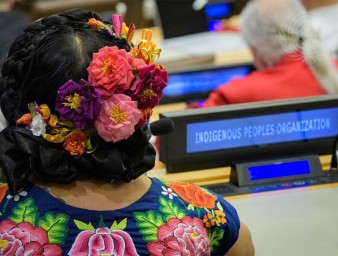One country’s example of promoting inclusion, justice, and respect for diversity
22 March 2018

On the eve of Black History Month, 30 January 2018, Prime Minister Justin Trudeau announced Canada’s official endorsement of the International Decade for People of African Descent (2015-2024). Trudeau was the first Head of State to voice publically his support for the Decade.
The country’s 2018 federal budget also reflects an important milestone in implementing the Decade in Canada - a CAD 214 million investment was earmarked for initiatives designed to remove racial barriers, promote gender equality, combat homo- and trans-phobia and enhance the quality of life of Black Canadians.
A main objective of the Programme of Activities of the Decade is to make national, regional and international action and cooperation stronger to realize the economic, social, cultural, civil and political rights of people of African descent and their full and equal participation in all aspects of society.
The UN Human Rights Office and Canadians are playing key roles to reach this objective.
Since 2015, the Office has been working with various stakeholders across Canada – federal and provincial governments, academia, and civil society – on the different aspects and activities of the Decade.
That year in June, the UN Human Rights Office participated in the inaugural Black Government Leaders Summit that took place in Nova Scotia. That historic event adopted guiding principles reflecting the objectives of the Programme of Activities of the Decade, and showcased policies and programmes undertaken by the African Nova Scotian Affairs (ANSA) aimed at improving the situation of African-Canadians in that province.
When the UN Working Group of Experts on People of African descent visited Canada in October 2016, they expressed deep concern about the overrepresentation in the criminal justice system of Black Canadians, as well as the excessive use of solitary confinement and the endemic and arbitrary use of “carding” against them. They also questioned the withdrawal of African Canadian children from their homes by child welfare agencies.
“African Canadians comprise 3% of the general Canadian population but they are 10% of the prison population,” the experts said at the end of their visit. “We urge the Government to develop and implement an African Canadian Justice Strategy to address the anti-Black racism and discrimination within the criminal justice system.”
In February 2017, the UN Human Rights Office and the Nathanson Centre for Transnational Human Rights, Crime and Security at the Osgoode Hall Law School organized a seminar in Toronto on Afro-descendants and their access to justice. That important contribution to the Decade examined the elements of access to justice in relation to the lived experiences of people of African descent. The Attorney General of Ontario, Yasir Naqvi, and the Honourable Elizabeth Dowdeswell, Lieutenant Governor of Ontario, addressed the seminar.
Later that month, the Government of Ontario followed-up by recognizing the Decade and launching its Black Youth Action Plan, committing CAD 47 million over four years to help reduce disparities for Black children, youth and families.
Since the creation of a Fellowship for People of African Descent at the UN Human Rights Office, Canadian fellows have come to Geneva every year to participate in the programme, returning home with new skills and knowledge about human rights that they can use concretely in their communities, and more broadly to the benefit of Canadian society.
Many Canadian stakeholders also participated in the Decade’s Regional Meeting for Europe, Central Asia and North America in Geneva in November 2017, where the Minister for Anti-Racism Michael Coteau of the Province of Ontario sent an important message of support.
In Toronto in December 2017, the Michaëlle Jean Foundation and the civil society organization, the Federation of Black Canadians, officially launched the Decade at the national level with a high-level summit of 800 people of African descent and other stakeholders.
A Strategic Action plan will be released in March, outlining the ways in which community groups across Canada will advance the aims of the Decade, including in the areas of criminal justice, education, media representation, arts and affordable housing.
Trudeau’s announcement and Canada’s numerous activities already implemented for the Decade across the country send a resounding message: standing up for the human rights of people of African descent is a shared endeavour amongst all stakeholders. They also highlight the impact of the UN Human Rights Office in working with all national stakeholders towards changing the lives of people of African descent.
“The UN Human Rights Office hopes that this recognition and the examples of the Office’s engagement with Canadians on the Decade will spur other countries to increase their support for the Decade’s activities, and help improve the lives of people of African descent in every region,” said Yury Boychenko, Chief of the Anti-Racial Discrimination Section at the UN Human Rights Office.
“In this fourth year of the Decade, we also stand up to combat racism and make a difference in the lives of the many victims worldwide, including people of African descent,” he added.
22 March 2018




